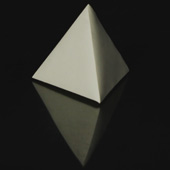Geometry is a science that deals with the study of inherent properties of form and space through examining and understanding relationships of lines, surfaces and solids. These relationships are of several kinds and are seen in forms both natural and man-made. The relationships amongst pure geometric forms possess special properties or a certain geometric order by virtue of the inherent configuration of elements that results in various forms of symmetry, proportional systems etc. These configurations have properties that hold irrespective of scale or medium used to express them and can also be arranged in a hierarchy from the totally regular to the amorphous where formal characteristics are lost.
The objectives of this course are to study these inherent properties of form and space through understanding relationships of lines, surfaces and solids. This course will enable understanding basic geometric relationships, both 2D and 3D, through a process of exploration and analysis. Concepts are supported with 3Dim visualization of models to understand the construction of the family of geometric forms and space interrelationships.
Contents:
1. Geometrical construction – Basics.
2. Golden Proportions and construction of Golden Spiral.
3. Study of Polygons.
4. Regular and Semi-regular geometric grids.
5. Platonic Solids and study of their inter-relationships.
6. Truncations of Platonic solids and Derivation of Archimedean Solids.
Materials required for Geometrical Construction of paper models:
You are encouraged to construct three dimensional paper models to understand better the concepts in geometrical construction and their inter-relationships. The following list of material will be necessary to make paper models:
1. Drawing board.
2. T-square (good quality, inexpensive plastic ones are available).
3. Transparent plastic set squares 30/60° and 45°, Size 20 cm and protractor.
4. Transparent plastic scale marked in cm and mm 50 cm. lengths.
5. Drawing instruments – compass large, bow compass, divider (fairly accurate, sturdy and
inexpensive).
6. Wooden, drawing pencils in grades 2H, H, HB, B (from hard to soft).
7. Cartridge drawing paper for drawing exercises.
8. Bond paper for notes, exploratory exercises and paper folding exercises.
9. Ivory card and box board for 3D models.
10. Metal scale to be used as cutting edge.
11. Paper cutter with blades.
12. Razor blades for sharpening pencils.
13. Erasers.
14. Tube of adhesive for model building (FEVICOL or equivalent).
15. Drawing pins or Cello-tape.


